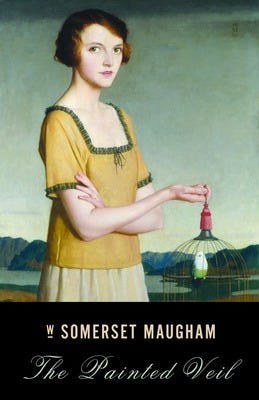The year 1925 saw the publication of F. Scott Fitzgerald’s The Great Gatsby, Virginia Woolf’s Mrs. Dalloway, Franz Kafka’s The Trial, and W. Somerset Maugham’s The Painted Veil. It was a year for novels about miserable characters leading miserable lives. Yet, in The Painted Veil, Maugham looks beyond the glamor of Gatsby and the despair of Dalloway. Taking inspiration from Dante’s Purgatorio and Percy Bysshe Shelley, Maugham lifts “the painted veil which those who live / Call Life.”1
Enchantment and Disenchantment
The Painted Veil is about Kitty Garstin, your average upper-middle-class postwar debutante. Pretty but not beautiful, charming but not alluring, at the ripe old age of 25 Kitty watches her younger sister marry before accepting the proposal of Walter Fane, an undemonstrative bacteriologist. Kitty knows she is not in love, but Walter’s posting to British Hong Kong means she can escape her dull life, and they begin their marriage on the other side of the world.
In Hong Kong, Kitty realizes that her ennui stowed away with her. Flattered by attention from a local bigwig, she embarks on an affair with Charlie Townsend. Two years later, when Walter discovers their adultery, Charlie’s promises to divorce his wife for Kitty vanish like a vapor. Kitty discovers the depth of love Walter had held for her when he gives her an ultimatum: they must divorce (and harm Charlie’s career by naming him as Kitty’s lover) or go to Mei-tan-fu, a remote city in China riddled with cholera.
Kitty leaves her lover behind, believing she is traveling to certain death. At least her sacrifice is the best choice for Charlie, though Walter has grown utterly distant from her. Upon arrival in Mei-tan-fu, she is astonished by the beauty of the landscape: “Here was Beauty. She took it as the believer takes in his mouth the wafer which is God.”2

Life in Mei-tan-fu is marked by death. Walter spends all his time trying to mitigate the spread of cholera: “The people were dying at the rate of a hundred a day….[they] died so fast that it was hardly possible to bury them.”3 Kitty is instructed to avoid contact with anyone in the village, and her only friend is her neighbor Waddington, an English official who has made peace with his surroundings. For the first time since her arrival in China, Kitty begins to see Chinese people and their culture as beautiful.
It seemed to her that, perhaps unconsciously, [Waddington] had adopted the Chinese view that the Europeans were barbarians and their life a folly: in China alone was it so led that a sensible man might discern in it a sort of reality. Here was food for reflection: Kitty had never heard the Chinese spoken of as anything but decadent, dirty, and unspeakable. It was as though the corner of a curtain were lifted for a moment, and she caught a glimpse of a world rich with a color and significance she had not dreamt of.4
Maugham, who traveled extensively in Asia, perhaps knew firsthand that immersion in other cultures sloughed off illusions. This is Kitty’s journey, one by one shedding the illusions that calloused her heart.5 She had lived by lies, and beauty opened to her a world of truth and personal connection that she had never known before.
“A Great Misfortune to Have a Heart”
In his preface, Maugham reveals his inspiration for The Painted Veil in Canto V of Dante Alighieri’s Purgatorio:
‘Pray when you go back to the world,
And are well rested after your long journey,’
The third spirit followed upon the second,‘Remember then, who am La Pia:
Siena made me and Maremma undid me;
He knows it well, that man who, having declaredHis formal intention, married me with his ring.’6
This canto is set on the shore of Purgatory, where linger the late repentant, including those who died unabsolved in violent death. Pia dei Tolomei was murdered by her husband; did he regret his marriage to her, or did his jealousy override him? Maugham, who encountered this canto while studying in Italy, was told that Pia’s husband suspected her of adultery and tried to suffocate her in the “noxious vapors” of his castle in Maremma, finally throwing her out of a window.7 Though we have but six lines about Pia in Purgatorio, we can assume she was virtuous, due to Dante’s placing of her in Purgatory rather than Hell.
The Painted Veil owes more than this spark of story to Dante. The Divine Comedy is a journey into the depths of Hell, an ascent up Mount Purgatory, and a pilgrimage in Paradise. Similarly, The Painted Veil follows Kitty’s descent into an affair and her journey to a deadly place. Maugham explores Mei-tan-fu as the site of Kitty’s purgation of her old self, who coveted affection, lied to her husband, and committed adultery. In Mei-tan-fu, Kitty has Waddington and Sister St Joseph, the Mother Superior of the local missionary convent, as her Virgil and Beatrice.
Even as they live separate lives—for Walter chooses emotional distance as a way to cope with Kitty’s infidelity—Kitty glimpses another side of Walter, “his immense capacity for loving.”8 As she begins to truly see the world around her for the first time, she also finds a new energy, which she gives to local children by working alongside the nuns. Through her relationship with Sister St Joseph, Kitty is able to discuss something of her past, wryly telling her, “It is a great misfortune to have a heart.” Sister St Joseph, schooled in love, knows better: “It is a great good fortune to consecrate that heart to the love of Jesus Christ….There is only one way to win hearts and that is to make oneself like unto those of whom one would be loved.”9
Conclusion
As she leaves Mei-tan-fu, Kitty faces seeing Charlie again, and realizes that any feeling she had for him vanished. Kitty witnesses the change that has occurred in her soul:
Freedom! That was the thought that sung in her heart so that even though the future was so dim, it was iridescent like the mist over the river where the morning sun fell upon it. Freedom! Not only freedom from a bond that irked, and a companionship which depressed her; freedom, not only from the death which had threatened, but freedom from the love that had degraded her; freedom from all spiritual ties, the freedom of a disembodied spirit, and with freedom, courage, and a valiant unconcern for whatever was to come.10
The Painted Veil, while recognized as one of Maugham’s great literary gifts to the world, has not received its full due as a novel of religious questioning. Decades before Graham Greene’s The End of the Affair and Evelyn Waugh’s Brideshead Revisited, Maugham demonstrated that beauty creates a desire for God that not false love can satisfy. While Maugham does not include a dramatic conversion in The Painted Veil, he explores the same questions with the exquisite tenderness of Greene and Waugh.
Maugham took his title from Shelley’s sonnet about disillusionment. “Lift not the painted veil,” Shelley cautions, for he “knew one who had lifted it,” who “strove / For truth, and like the Preacher found it not.” Like his contemporaries Fitzgerald, Woolf, and Kafka, Maugham could have arrived at “vanity of vanities, all is vanity.”11 When Maugham lifts the painted veil for Kitty, she finds something solid, more real than what she has yet known.
Maugham leaves the end uncertain (and there is much of the plot I have left unspoiled). We do not know if Kitty chooses faith, though Sister St Joseph’s words open the door for it, when used to interpret the final chapter: “when love and duty are one, then grace is in you and you will enjoy a happiness which passes all understanding.”12 In The Painted Veil I read a profound longing for belief, even if it is not an arrival at belief.13 Maugham himself was no straightforward believer, but in this novel he shows how attractive is the way of love to someone who has settled for falseness her whole life. In this way he joins Dante and the great writers of the Christian tradition, though he only gives us a sliver of Kitty’s life, and she continues her journey off the page.
The Painted Veil asks for authenticity, not that of influencers and politicians, but for living in such a way that one is not lying to oneself or others. I find The Painted Veil an exploration of Ignatian spiritual freedom, of Jesus’ love that makes all things well in the visions of Julian of Norwich, of the creedal Christian audacity to boast in life everlasting. Maugham shocks Kitty with beauty, and her response is “compassion and charity….[and] peace.”14
The Painted Veil is economical, clocking in just under 250 pages. If you are looking for a novel to read in 2025 that was published in 1925, is timeless in its themes, and presents those themes afresh, you may find much to enjoy here.
The 2006 adaptation fleshes out Walter, and cleverly tweaks the ending to unmask Kitty’s character growth. Alexandre Desplat’s superb score is a constant on my reading playlist.
Maugham took the title from Percy Bysshe Shelley’s sonnet “Lift Not the Painted Veil:”
Lift not the painted veil which those who live
Call Life: though unreal shapes be pictured there,
And it but mimic all we would believe
With colours idly spread,—behind, lurk Fear
And Hope, twin Destinies; who ever weave
Their shadows, o’er the chasm, sightless and drear.
I knew one who had lifted it—he sought,
For his lost heart was tender, things to love,
But found them not, alas! nor was there aught
The world contains, the which he could approve.
Through the unheeding many he did move,
A splendour among shadows, a bright blot
Upon this gloomy scene, a Spirit that strove
For truth, and like the Preacher found it not.
The Painted Veil, Vintage International, 97.
The Painted Veil, 98.
The Painted Veil, 104.
Through Waddington, Maugham allows for benign illusions: “I wonder if it matters that what they [the nuns] have aimed at [life everlasting] is illusion. Their lives are in themselves beautiful.” (196)
Lines 13-136 of Canto V of Purgatorio. Dante, The Divine Comedy (translated by C. H. Sisson; Oxford World’s Classics, 2008).
The Painted Veil, preface, 5.
The Painted Veil, 124: “He was at his best when you were ill; he was too intelligent to exasperate, and his touch was pleasant, cool, and soothing. By some magic he seemed able by his mere presence to relieve your suffering. She knew that she would never see again in his eyes the look of affection which she had been so used to that she found it merely exasperating. She knew now how immense was his capacity for loving; in some odd way he was pouring it out on these wretched sick who had only him to look to.”
The Painted Veil, 179.
The Painted Veil, 210.
“Vanity of vanities, saith the Preacher, vanity of vanities; all is vanity.” Ecclesiastes 1:2 AKJV. Fitzgerald’s Gatsby, who has lived a lie, dies with his love unrealized; Nick’s ending is disenchantment Gatsby’s life and world. Woolf’s Mrs. Dalloway looks on a suicide with approval. Kafka’s Josef dies “like a dog.”
The Painted Veil, 206.
See Kitty’s conversation with Waddington about the nuns’ hope for life everlasting on pages 195-197.
The Painted Veil, 246-247.







Ah I'm glad you did a post on The Painted Veil, and your thoughts here are so rich. I can't remember if I've read it. I think I did but it was before I was tracking my reading, so this is definitely making me want to pick it up. I was very moved by the film when I saw it years ago, and have always really loved that line: “when love and duty are one, then grace is in you". A good quote to live by. I didn't know about the influence of Dante and Shelley on Maugham. Super interesting!
And agreed on Desplat's beautiful score. The film also introduced me to the French song "A la claire fontaine" which I've since sung to my babies while rocking them.
Interesting that the story chronicles the transitions and transformation that should be part of the life experience of a true believer, without fully embracing or divulging a singular epiphanic experience that seems to accompany the life-change that belief and obedience to the call of Christ would produce. But then I guess it is the prerogative of the author to retain some mystery. Thank you for sharing!